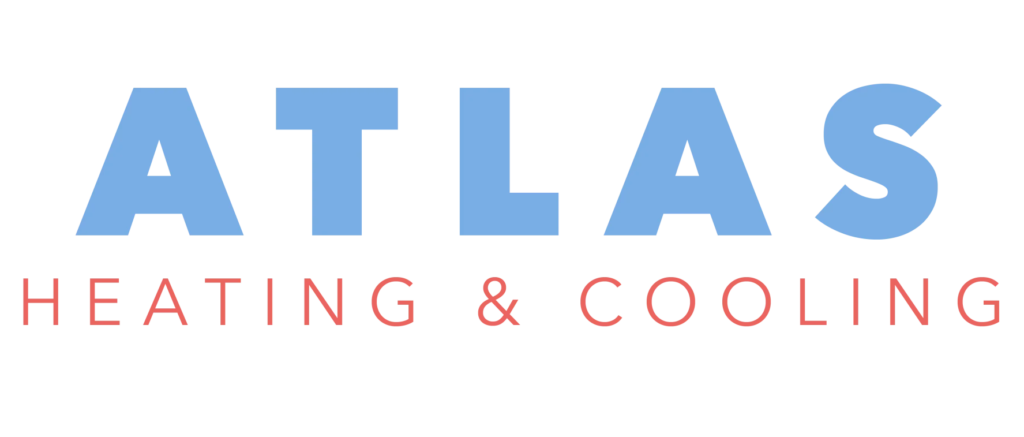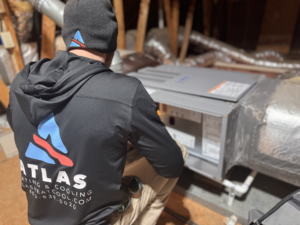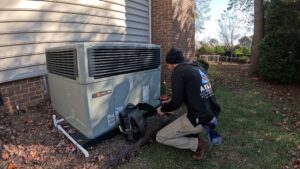Choosing the right HVAC system for your home goes beyond comfort and lower energy bills. At Atlas Heating & Cooling, we help you find trusted HVAC systems near you that reduce emissions and support cleaner energy use. Whether you need air conditioning repair or a full system upgrade, the right equipment makes a difference.
High-efficiency HVAC units not only save energy but also contribute to Rock Hill’s environmental goals. Our team specializes in providing dependable heating and cooling solutions that protect both your home and the planet. Upgrading to an efficient HVAC system benefits your household and supports a healthier community. Let Atlas Heating & Cooling guide you toward smarter HVAC choices that deliver comfort and sustainability.

Introduction to High-Efficiency HVAC Systems
High-efficiency HVAC systems deliver the same comfort levels as standard units while using less energy. Understanding how these systems work and how their performance is measured helps you choose the best option for your home.
What Defines a High-Efficiency HVAC System
A high-efficiency HVAC system uses technology that reduces energy consumption without compromising comfort. These systems rely on advanced components like improved compressors that operate more smoothly and refrigerants designed to have less environmental impact. Airflow controls are also enhanced to direct conditioned air more effectively throughout your home.
How Efficiency Ratings Are Measured
Efficiency ratings provide a clear way to compare HVAC systems by their energy use. SEER, AFUE, and HSPF ratings each focus on different parts of heating and cooling performance.
- SEER (Seasonal Energy Efficiency Ratio) measures how efficiently an air conditioner cools over a typical cooling season. Higher SEER ratings indicate less energy used per unit of cooling.
- AFUE (Annual Fuel Utilization Efficiency) shows how well a furnace converts fuel into heat. A furnace with 90% AFUE converts 90% of the fuel to heat and loses only 10% through exhaust, improving fuel savings.
- HSPF (Heating Seasonal Performance Factor) rates the efficiency of heat pumps during heating seasons. Higher HSPF values mean the heat pump uses less electricity to generate the same amount of heat.
Each rating directly connects to energy use and environmental impact. Systems with higher scores require less fuel or electricity, which reduces emissions tied to energy production.
At Atlas Heating & Cooling, we help homeowners in Rock Hill find HVAC systems near you that meet high-efficiency standards, reducing energy costs and minimizing environmental impact.
Environmental Advantages of High-Efficiency HVAC Systems
High-efficiency HVAC systems offer more than energy savings—they play a key role in reducing environmental impact. By choosing modern, efficient heating and cooling equipment, you contribute to lowering emissions and easing the strain on local power resources.
Reduced Greenhouse Gas Emissions
Switching to a high-efficiency HVAC system can lower the amount of carbon dioxide your household generates. Older HVAC models use more electricity, which often comes from fossil fuel power plants, increasing greenhouse gas emissions. For example, homes with outdated air conditioners can consume more electricity than those with newer, efficient units. This extra usage translates directly to more CO₂ released into the atmosphere. By upgrading, your home’s carbon footprint shrinks, supporting better air quality in your community.
Connection Between HVAC and CO₂ Output
The energy your HVAC system consumes has a direct impact on the amount of carbon dioxide power plants emit. Studies show that replacing an air conditioner older than 10 years with a high-efficiency model can reduce electricity use considerably. This means less demand for fossil-fueled electricity and a meaningful cut in household emissions. If you’re considering AC repair, this highlights the environmental benefits of replacing worn-out units rather than repairing inefficient ones.
Lower Energy Consumption and Utility Demand
High-efficiency HVAC systems use less electricity to maintain comfort in your home. This reduces the strain on local power grids, especially during hot weather when energy demand peaks. By lowering electricity use, these systems help prevent outages and contribute to more stable energy costs in the Rock Hill area. Choosing efficient cooling options supports the overall reliability and resilience of the local electrical grid.
Decreased Dependence on Fossil Fuels
Many modern high-efficiency HVAC systems work well with renewable energy sources like solar power. Heat pumps paired with rooftop solar panels allow homes to lower their reliance on fossil fuels. This shift supports broader community efforts to move toward cleaner energy generation. As renewable energy becomes more common, having compatible HVAC equipment will make it easier to maintain comfortable indoor temperatures with minimal environmental impact.
By upgrading to high-efficiency heating and cooling equipment, you play an active role in protecting the environment while enjoying lower energy costs. Atlas Heating & Cooling can help you explore HVAC systems near you that reduce emissions and align with your environmental values.
Long-Term Sustainability of Upgrading HVAC Equipment
Upgrading your HVAC system is more than a short-term fix; it’s an investment in lasting environmental benefits. Let’s explore how new equipment supports sustainability over many years and fits into today’s renewable energy landscape.
Reduced Waste from Longer System Lifespan
Modern HVAC units are built to last. Advances in materials and engineering extend their operational life by several years compared to older models. This durability reduces how often you need to replace your system, which in turn cuts down on landfill waste. Manufacturing fewer replacement units also lowers the demand for raw materials and energy used during production, leading to a smaller environmental footprint overall.
Compatible With Renewable Energy Systems
Many new HVAC systems work seamlessly with renewable energy sources like solar and wind power. Heat pumps with variable-speed compressors can adjust their output precisely to match the available clean energy, maintaining steady indoor temperatures. Pairing these systems with rooftop solar panels can reduce electricity drawn from the grid, lowering your home’s reliance on fossil fuels and contributing to cleaner energy use in your community.
Support for Greener Construction Standards
High-efficiency HVAC units play a key role in meeting green building certifications. These certifications emphasize not just energy savings but also water efficiency and improved indoor air quality. Buildings designed to these standards reduce resource consumption and provide healthier living environments. Choosing an HVAC system that meets or exceeds these benchmarks helps your home align with broader environmental efforts and can even increase property value.
At Atlas Heating & Cooling, we are ready to assist with HVAC upgrades that promote long-term sustainability while keeping your home comfortable and efficient with reliable heating and cooling near you.
Local Impact in Rock Hill and Surrounding Areas
Efficient HVAC systems play a vital role beyond individual homes—they influence the whole community. Knowing how these systems affect the local environment and infrastructure can help you see their broader value.
Benefits to the Local Electrical Grid
Using high-efficiency HVAC systems helps reduce the peak electricity demand in Rock Hill. During hot summer days, when air conditioning use spikes, the electrical grid experiences its highest loads. Older or inefficient units require more energy to cool the same space, pushing the grid closer to its limits. When many homes upgrade to efficient HVAC systems, overall energy consumption drops, which lowers stress on power plants and distribution networks. This reduction decreases the chances of power outages during peak hours, offering greater stability and reliability for all residents.
Improved Air Quality Through Better Filtration
Modern HVAC systems often come equipped with advanced filtration technologies designed to capture a wider range of airborne particles, including dust, pollen, mold spores, and other allergens. This means your indoor air quality improves, which benefits your health and comfort. In Rock Hill, where seasonal pollen and urban pollution affect many households, these filtration upgrades help reduce respiratory irritants and allergens indoors.
Role of HVAC in Local Environmental Goals
Rock Hill has implemented local building codes and sustainability programs to promote energy conservation and reduce emissions. High-efficiency HVAC systems help residents contribute to these goals by using less electricity and cutting greenhouse gas emissions from fossil-fuel power generation. Switching to upgraded heating and cooling equipment aligns with efforts to improve both environmental health and quality of life citywide.
At Atlas Heating & Cooling, we are committed to helping homeowners in Rock Hill find and install HVAC systems that benefit both their households and the local environment. By choosing the right equipment and upgrades, you play a part in strengthening the community’s energy resilience and air quality for everyone.
Choosing the Right HVAC System for Environmental Benefits
Picking the right HVAC system affects both your home’s comfort and its environmental footprint. This section guides you through key factors to consider when replacing or upgrading your heating and cooling equipment.
What to Look For When Replacing an Existing System
When it’s time to replace your current HVAC system, focus on models certified by ENERGY STAR with high SEER (Seasonal Energy Efficiency Ratio) and AFUE (Annual Fuel Utilization Efficiency) ratings. These certifications indicate that the equipment uses less energy while delivering effective heating or cooling.
Avoid older HVAC units, even if they come with a lower price tag. These outdated systems can consume more energy than newer, efficient models. Over time, this increased energy demand leads to higher utility bills and a larger carbon footprint, counteracting any initial savings from the purchase price.
Benefits of Professional Installation and Proper Sizing
The size of your HVAC system plays a major role in its performance and energy use. A system that is too large will cycle on and off frequently, wearing parts out prematurely and wasting energy. Conversely, an undersized unit struggles to maintain comfort, running constantly and using excessive power. Both scenarios increase emissions and operational costs.
Professional installation makes sure that your system matches your home’s specific heating and cooling needs. Experts use detailed load calculations to select the right size, considering factors like insulation, window placement, and local climate. If you require AC repair, consulting trained technicians for proper installation and sizing can improve system lifespan and energy efficiency.
Ongoing Maintenance for Maximum Environmental Impact
Routine maintenance keeps your HVAC system operating efficiently over its lifespan. Simple tasks like changing air filters regularly can improve airflow and reduce energy use. Neglecting maintenance causes systems to work harder, increasing electricity consumption and reducing indoor air quality by allowing dust and allergens to accumulate. This affects both your energy bills and the system’s environmental impact.
Atlas Heating & Cooling recommends selecting HVAC systems with the right sizing and scheduling regular maintenance. These steps help Rock Hill homeowners lower energy consumption and emissions while keeping homes comfortable year-round. Our team is ready to assist with all your heating and cooling near you needs, including system replacement, air conditioning repair, and preventive care.
How Atlas Heating & Cooling Helps Households Reduce Their Footprint
Finding HVAC solutions that reduce energy use and lower emissions is becoming a priority for many homeowners in Rock Hill. Choosing the right system can affect both your monthly bills and the environment over the long term.
High-Efficiency Options We Offer
At Atlas Heating & Cooling, we focus on offering HVAC systems that cut down on energy consumption while delivering reliable comfort. Our selection includes air conditioners and furnaces certified by ENERGY STAR, a label that identifies equipment meeting strict energy performance standards. These systems are built to handle South Carolina’s seasonal weather, so they perform efficiently throughout the year.
ENERGY STAR-certified units use less energy compared to standard models. For example, high-efficiency heat pumps and variable-speed air conditioners adjust their operation to meet your home’s needs without using extra power. This leads to lower energy bills and less strain on the environment.
Local Knowledge That Supports Regional Energy Goals
We recognize how the climate in Rock Hill and surrounding areas influences energy use. Summers here can be hot and humid, which puts pressure on air conditioning systems. Our team selects HVAC equipment designed to perform well in these conditions, helping you stay comfortable while using less electricity.
South Carolina has set goals to reduce energy consumption and increase renewable energy use. Upgrading your HVAC system contributes to these objectives by lowering household electricity demand, which in turn reduces pollution from power plants. Your choices at home can play a part in meeting community-wide environmental targets.

Real Benefits Our Customers Have Experienced
Many Rock Hill homeowners who have upgraded to high-efficiency HVAC systems notice tangible benefits. They often see utility bills drop, depending on whether the system has been replaced and on usage habits. Customers also report quieter operation, thanks to variable-speed motors that run smoothly rather than cycling on and off loudly.
Improved indoor air quality is another common outcome. Advanced filtration options in these systems help reduce allergens and pollutants, which supports better health for your family. These real improvements reflect how efficient HVAC technology can enhance your home environment while reducing its impact on the planet.
Make Smarter HVAC Choices with Atlas Heating & Cooling
At Atlas Heating & Cooling, we provide dependable HVAC services that meet today’s environmental and comfort expectations. Whether you need prompt air conditioning repair or a full system replacement, we’re here to help you choose equipment that supports energy efficiency and indoor comfort. Our team is local, experienced, and ready to provide trusted heating and cooling near you in Rock Hill and the surrounding area. Contact us at (803) 839-0020 or email ad***@***********ol.com to schedule a consultation or learn more about upgrading your system.




